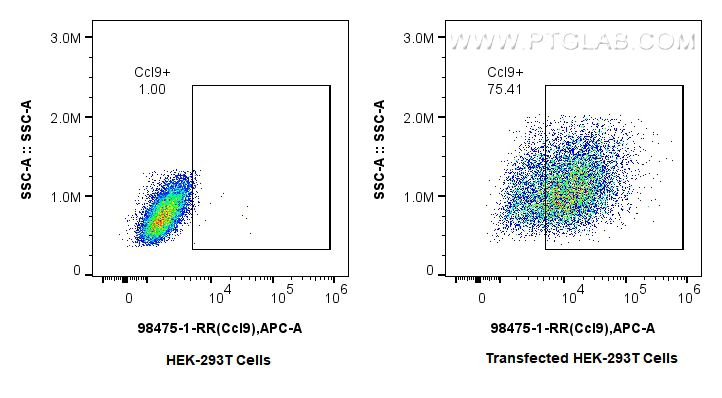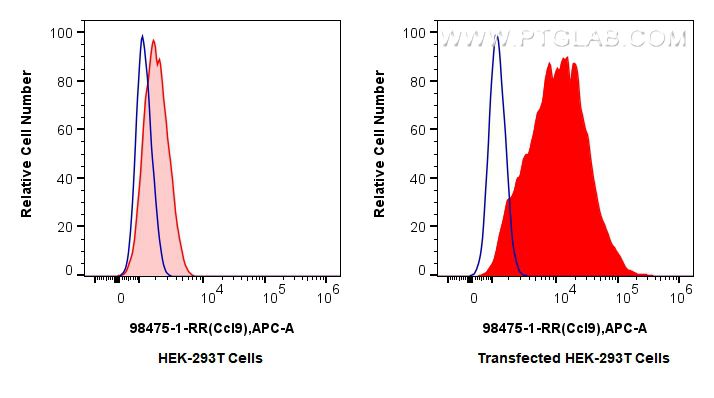Tested Applications
| Positive FC (Intra) detected in | Transfected HEK-293T cells |
Recommended dilution
| Application | Dilution |
|---|---|
| Flow Cytometry (FC) (INTRA) | FC (INTRA) : 0.25 ug per 10^6 cells in a 100 µl suspension |
| This reagent has been tested for flow cytometric analysis. It is recommended that this reagent should be titrated in each testing system to obtain optimal results. | |
| Sample-dependent, Check data in validation data gallery. | |
Product Information
98475-1-RR targets CCL9 in FC (Intra) applications and shows reactivity with mouse samples.
| Tested Reactivity | mouse |
| Host / Isotype | Rabbit / IgG |
| Class | Recombinant |
| Type | Antibody |
| Immunogen | CCL9 fusion protein Eg3336 Predict reactive species |
| Full Name | chemokine (C-C motif) ligand 9 |
| Calculated Molecular Weight | 14KD |
| GenBank Accession Number | NM_011338.2 |
| Gene Symbol | Ccl9 |
| Gene ID (NCBI) | 20308 |
| Conjugate | Unconjugated |
| Form | Liquid |
| Purification Method | Protein A purification |
| UNIPROT ID | Q3U9T8 |
| Storage Buffer | PBS with 0.09% sodium azide, pH 7.3. |
| Storage Conditions | Store at 2 - 8°C. Stable for one year after shipment. |
Background Information
Mouse C-C motif ligand 9 (CCL9), alternatively named macrophage inflammatory protein 1γ (MIP-1γ), was identified in 1995 and is homologous to the mouse CCL6, as well as human CCL23 and CCL15. It is noted that CCL9 is also known by various names such as macrophage inflammatory protein-1 gamma (MIP-1ɣ), macrophage inflammatory protein-related protein-2 (MRP-2) and CCF18 in rodents. Monocytes and myeloid cell lines produce large quantities of CCL9, as do dendritic cells and T cells, in particular Th1 type T cells. Despite high baseline levels in circulation, it has become apparent that concentrations of CCL9 vary greatly in specific tissues with profound effects on health. For example, in the bone, CCL9 is produced at even higher levels, and is critical to osteoclast versus osteoblast differentiation of macrophages. There are also indications of a timed specific induction of CCL9 in skin wound healing and follicle-associated epithelium of the gut.
Protocols
| Product Specific Protocols | |
|---|---|
| FC protocol for CCL9 antibody 98475-1-RR | Download protocol |
| Standard Protocols | |
|---|---|
| Click here to view our Standard Protocols |





